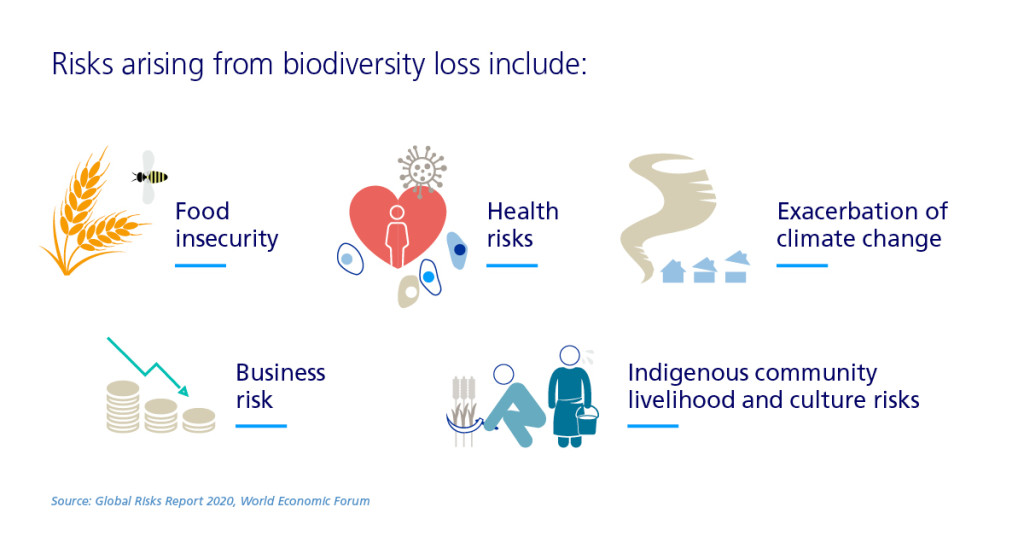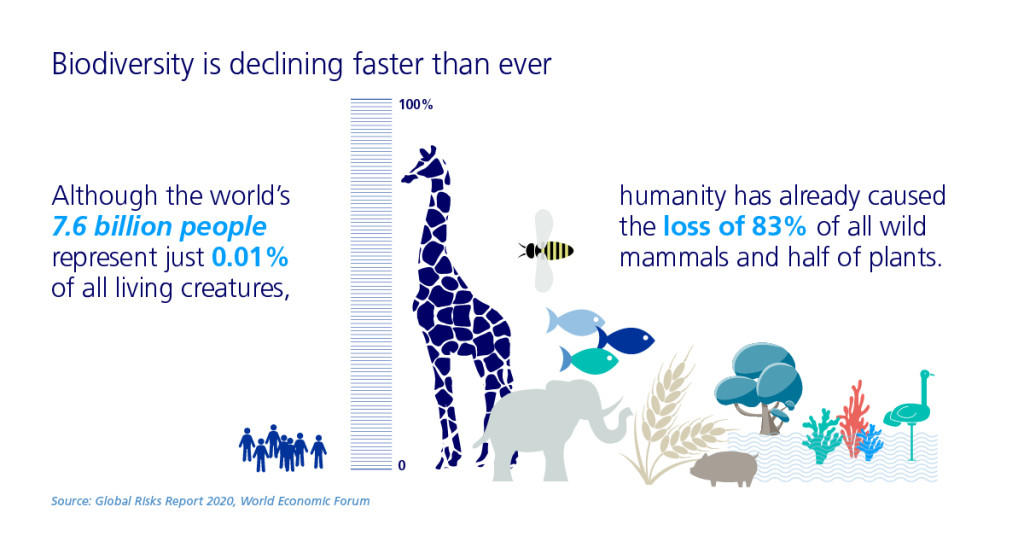Reality Hits the Davos Crowd: Biodiversity is Actually Important
Jan 21st, 2020 | By admin | Category: Biodiversity/ConservationBy Suzanne York.
The new year kicked off with a lot of coverage of extinction, mostly due to the tragedy in Australia. Television news programs, newspapers and social media are awash in reports of the devastating impact of Australia’s raging fires on its enigmatic species. The images of koalas, kangaroos and wallabies burning are tragic and heartwrenching.One report out of the University of Sydney estimated that close to a billion animals, from mammals to birds to insects, might have perished in the wildfires. Koalas are the poster child, and it is feared that between 25,000 to 50,000 might have perished.
The loss of biodiversity in last year’s Amazon fires could be just as dire. Fires, deforestation, climate change, and overdevelopment are all driven by humans and in particular, a global economy predicated on resource extraction and demand for more, more, more.
Are Businesses Waking Up?
Thus it is ironic, and maybe a breath of fresh air, that the World Economic Forum (WEF), taking place this week in Davos, Switzerland, highlighted biodiversity loss as the third biggest risk facing the world.
Here’s the breakdown of the top five risks, assessed by WEF:
The top five global risks in terms of likelihood and severity of impact are:
- Extreme weather events with major damage to property, infrastructure and loss of human life.
- Failure of climate-change mitigation and adaptation by government and business.
- Major biodiversity loss and ecosystem collapse (terrestrial or marine) with irreversible consequences for the environment, resulting in severely depleted resources for humankind as well as industries.
- Major natural disasters such as earthquakes, tsunamis, volcanic eruptions and geomagnetic storms.
- Human-made environmental damage and disasters, including environmental crime, such as oil spills and radioactive contamination.
Not mentioned, but instrumental in all five global risks, is the impact of a growing and mostly overconsuming human population that currently stands at nearly 7.8 billion. Perhaps next year the WEF will address the lack of access to voluntary family planning and reproductive health services, along with the drivers of poverty and inequity.
It would appear, as the world begins the 2020 decade, that climate change and other drivers of planetary degradation are receiving long overdue attention. Still, the World Economic Forum is the gathering of economic elite, not ‘tree-huggers’ and they will almost certainly be concerned with how best to make profit off of the aforementioned risks.
An “Empty World”
Meanwhile, the United Nations is ringing alarm bells on the extinction crisis. Elizabeth Maruma Mrema, the acting executive secretary of the UN Convention on Biological Diversity, issued a bleak warning to the world in an interview with The Guardian, saying that humanity will have given up on planet Earth if world leaders cannot reach an agreement this year to stop the mass extinction of wildlife and destruction of life-supporting ecosystems.
According to Ms. Mrema, “People’s lives depend on biodiversity in ways that are not always apparent or appreciated. Human health ultimately depends on ecosystem services: the availability of fresh water, fuel, food sources. All these are prerequisites for human health and livelihoods.” Otherwise, she said, we risk living in an “empty world.”
Last week, the UN released a draft plan à la the Paris Climate Agreement that calls for a commitment to protect at least 30% of the planet, and with controls on invasive species and pollution from plastic waste and excess nutrients to be reduced by 50% by the year 2030.
One scientist told The Guardian that “this is the floor, not the ceiling. Now every government on Earth must get behind this bold mission and drive through a global agreement for nature this year.”
Awareness is increasing and people are mobilizing and calling for action. The question is, will governments listen and start implementing the much needed policies to advance change?
What would make the above efforts even stronger (other than having started this thirty or more years ago) would be including a focus on rights of nature, alternatives economies, agroecology and family planning and reproductive rights. It’s up to us to demand more, for our sake and for a liveable planet for all species.
For more on the biodiversity crisis and potential solutions, please check out this issue of The Ecological Citizen.
Suzanne York is Director of Transition Earth.

![[photo: https://commons.wikimedia.org/wiki/File:Cutest_Koala.jpg]](http://populationgrowth.org/wp-content/uploads/2020/01/koala-300x275.jpg)

